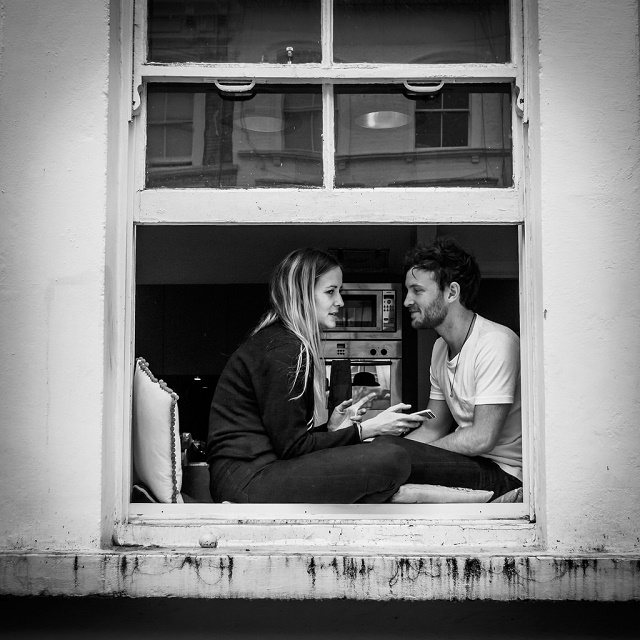
As a mom of two, I’ve done my fair share of vomit catching—and, sometimes, not catching.
There have been those middle of the night episodes that require leaning your child over the edge of the bathtub for a 3 a.m. hair wash. There have been those too late, desperate cries of “Mooommm!” from the back seat of the car, and then the dreaded sound and necessary roadside clean up, usually involving dirty car napkins and wads of grass from the ditch. I have caught puke in half-drunk cups of Starbucks coffee, balled-up-clothing-turned-catching-mitt, grocery bags still containing food items, and, yes, even in my hands.
An instance that stands out among all the others happened just moments from my own driveway. My son had been complaining of feeling carsick, which he often did. So I placated him, which I often did. But in this instance, I wasn’t taking him seriously enough. Just moments from home, he erupted. I desperately reached around to pass him a half-eaten bag of Goldfish crackers, which he held in his hands, then proceeded to oscillate his face, aiming in every direction but the Goldfish receptacle.
My daughter was, at first, filled with great compassion for her big brother, who was in distress. Her initial sounds were of sympathy and kindness, cooing her comfort like a little mama—until she caught wind of the smell. As it wafted to her side of the vehicle, she began to gag and wretch, too. Her dialogue moved rapidly from compassion to disgust, and then demands for self-preservation.
I’m laughing my head off as I remember this, just as I did when both of my kids were throwing up in the back seat. I rolled down the windows and comforted them through snorts of laughter. Because that is how these situations affect me.
Throw up stories are hilarious, but we’re not really talking about physical illness here. The incident in my car impacted me on a level more visceral than vomit. I began to contemplate how, in theory, we want to be the kind of people who can come alongside others. We want to be able to handle the hard stuff. We like the idea of being the support network for people during their dark nights.
But theory is different from practice; and like the compassion turned disgust in the car, we can become easily repulsed when people actually get sick. Because sick people throw up. And it’s messy.
Doing life together in a way that is rich and meaningful means that we get to be there for the celebratory, joyous times, but also for the hard parts. And the gross parts. It means that sometimes, we’ll experience one another as the best version of ourselves. And sometimes, as the worst.
Maybe you’re supporting one of your people during a difficult season right now, and it’s exhausting. Or maybe, in this moment, one of your people is holding your hair back for you while you lean over the bowl.
We need to know who our people are. Who are the ones we are supposed to walk with and do life with on this level? Of course we desire to be kind, loving, and gracious to all people, but let’s be honest. There are a select few whom I would invite or allow into those truly raw and awful moments. Throwing up in front of someone is humbling, because you simply cannot control the ghastly sounds coming out of you. And holding back the hair of someone who is ill, while being in such close proximity to their vomit, is an assault on all senses. Both require a level of intimacy and safety that you simply cannot (and would not want to) share with everyone.
Sometimes committing to this level of intimacy means listening to your friend retell the demise of her marriage for the 8,000th time.
Sometimes it’s my husband listening patiently to me as I try to figure out why I feel worried (again).
Sometimes it looks like showing up with snacks and red wine.
Sometimes it looks like sending your new mom-friend to bed while you pace the floor with her crying baby.
Sometimes it means crawling into your person’s darkness with them and just being quietly present.
Sometimes it means sticking around at the hospital, or police station, or funeral home.
Sometimes it looks like laying in your child’s bed with them, well past their bedtime (and well into grown-up time), as they open up their heart and say the things they are unable to say in daylight.
At times, it might mean speaking truth to an unwilling recipient and calling them on their crap.
But at other times, it means letting your person safely spew negativity and poison, without shaming them for being sick, knowing that once they’ve finished, they’ll feel better and be able to see more clearly. And then comes the hard part—letting them off the hook for all of the ridiculous, paranoid ideas they held true only minutes before.
Being present when someone vomits can mean that you end up caught in the crossfire of something that has nothing to do with you. But it also means you’re the safe person who bears the brunt, or your safe person bears the brunt for you.
There are seasons and situations when we are ready for it. In times of crisis and grief, we expect a modified or sickly version of our person, and so, grace flows freely and unreservedly. When someone is in excruciating pain, it can feel effortless to forgive and excuse hurtful lashing out. When the reason for the illness is obvious, we are better able to quell the resentment that can infiltrate, the kind of resentment that comes from absorbing all the extra work and caring selflessly while our hurting person abdicates their life and numbs their pain with television and naps—at least for a while.
Carrying a burden with or for one of your people may feel heroic and adrenaline-charged in the beginning, but what happens when the onerous season endures longer than our grace endures? When the other side is not yet in sight? When suddenly, we’re the one needing Netflix and naps?
Creating space for someone does not mean we abandon all boundaries and embrace martyrdom, or that we ignore our own needs and stifle self-care. We can speak truth, even as we support. One of the most helpful things my people can do for me when I’ve lost the plot is to tell me the story of who I really am. To remind me that this thing I’m experiencing, these feelings I’m feeling, they are not the new me. They are not the new normal.
It’s okay for us to remind our people of who they really are and to challenge their perceptions. Rather than diminish their pain, sending shameful “get over it!” and “suck it up!” messages, we can be a point of light on the horizon. We can be a reminder that although this is hard, there is life beyond. We can tenderly shift the perspectives of our people by lifting their chins so they can see the life that exists beyond the toilet bowl. And if they’re blinded by grief or they can’t even lift their heads, we can tell them the stories of better times, better seasons. We can speak hope and life and truth—right there on the bathroom floor, right there in the mess.
We don’t always do it well. Because we’re humans, we sometimes recoil in disgust. We run from pain. We make judgements on how others navigate their hard seasons. We tire of negativity. Our empathy short circuits. It goes on for too long. We don’t listen for the whole story. We lose sight of the fact that, often, people aren’t just being crappy for no reason. We forget that it is an honour to hold space for our people and carry their stories. When this happens, we desert our people when they most need us to offer comfort, solace, and a cool cloth. There is no judgement and no shame for this.
We have all let our people down at one point or another. What’s beautiful is that we can simply begin again; we can start over right now. We can step in close, hold back hair, and whisper words of comfort.
This is love, friends.
Relationships that mean something can bear the weight of a heavy soul. (I am not talking about toxic or abusive relationships—that’s a different conversation.) The only option for those who will not endure the smell of vomit, or who refuse to handle the occasional mess, is to do life alone.
And I would argue, then, that the word life would need to be substituted with something much more meagre, sad, and one-dimensional. For me, the choice is easy. I’m choosing to do life with my people in a way that is rich and meaningful. I am all in—for the tears and the parties, for the worst and best versions, in sickness and in health.
The only thing I cannot promise is that your actual barfing won’t make me laugh, because, like I said, that is how these situations affect me.
Author: Ellen Pusch
Image: Per Gosche/Flickr
Editor: Nicole Cameron






Read 0 comments and reply